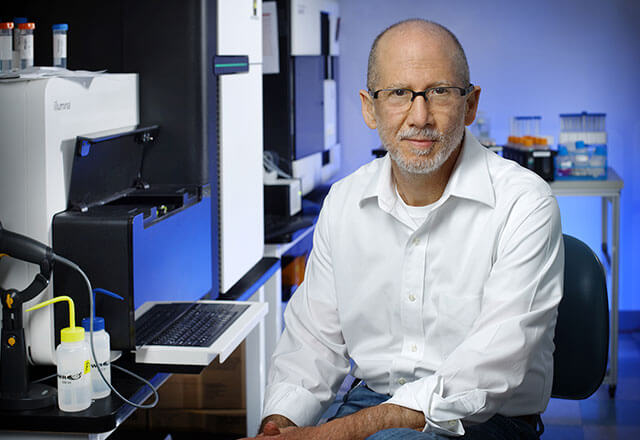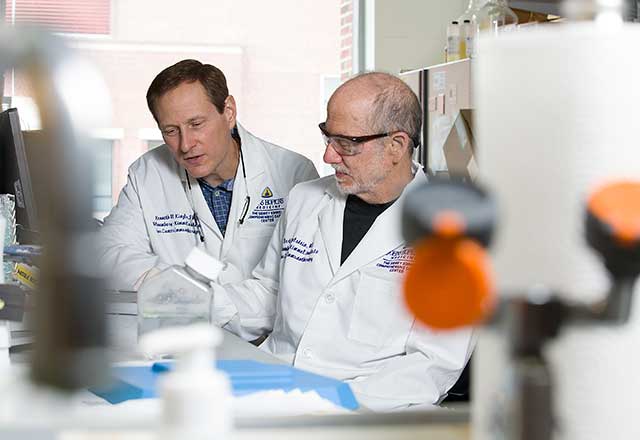Genetics
 Bert Vogelstein, M.D., directs the Genetics Program at the Bloomberg~Kimmel Institute for Cancer Immunotherapy.
Bert Vogelstein, M.D., directs the Genetics Program at the Bloomberg~Kimmel Institute for Cancer Immunotherapy.The convergence of genetics with immunotherapy is a direct result of the spirit of scientific collaboration at the Johns Hopkins Kimmel Cancer Center.
Thanks to the groundbreaking work of renowned Johns Hopkins scientist Bert Vogelstein, M.D., the world has known for some time that cancer is a disease caused by mutations in the genetic code. Now, it’s become clear that genetics aren’t just at the root of cancer, but may play a key role in predicting how patients respond to cancer therapies.
Identifying genetic predictors of immunotherapy response
In 2015, an immune modulation study on anti-PD-1 revealed only one of 32 colon cancer patients responded to treatment despite the successes being seen with the treatment in melanoma and lung cancer.
Investigators Drew Pardoll, M.D., Ph.D., and Suzanne Topalian, M.D., shared their findings with Dr. Vogelstein’s team at the Kimmel Cancer Center’s Ludwig Center, where other colleagues quickly theorized that the responding colon cancer patient must have had an abnormally high number of mutations due to an inherited disorder called Lynch syndrome.
Immune cells are more likely to recognize and react against cancer cells that have more mutations, like those in many cases of melanoma and lung cancer. The anti-PD-1 immunotherapy was successful in this one colon cancer patient because his cancer contained an unusual amount of mutations, making it easier for his immune system to differentiate the cancer cells from the normal cells.
The immunology-genetics connection was made. And now, through the Genetics Program at the Bloomberg~Kimmel Institute, investigators are looking to build upon it.
Bert Vogelstein Laboratory
Principal Investigator
Bert Vogelstein, M.D.
The Bert Vogelstein Laboratory seeks to develop new approaches to the prevention or treatment of cancers through a better understanding of the genes and pathways underlying their pathogenesis.
Our major focus is on cancers of the colon and rectum. We have shown that each colon neoplasm arises from a clonal expansion of one transformed cell. This expansion gives rise to a small benign colon tumor (called a polyp or adenoma). This clonal expansion and subsequent growth of the tumors appears to be caused by mutations in oncogenes and tumor suppressor genes, and the whole process is accelerated by defects in genes required for maintaining genetic instability. Mutations in four or five such genes are required for a malignant tumor to form, while fewer mutations suffice for benign tumorigenesis. As the mutations accumulate, the tumors become progressively more dangerous.
Current studies are aimed at the further characterization of the mechanisms through which these genes act, the identification of other genes that play a role in this tumor type, and the application of this knowledge to patient management.

Junior Faculty Lab Members
Genetics Program
What is genetics?
Genetics is the study of genes, which are made from DNA and are responsible for making specific proteins or molecules that perform important cell functions.
What does it have to do with cancer?
Mutations in the genetic code can be indicative of cancer, and they can also help geneticists identify individuals who are susceptible to certain types of cancer, or who might be responsive to certain types of treatment.
What are the program goals?
Identify genetic subsets of patients who may be more responsive to certain types of immunotherapies, and use this knowledge to treat patients earlier and with therapies that are more likely to work.
What have researchers at Johns Hopkins learned so far?
Cancers with more genetic mutations respond better to anti-PD-1 immunotherapy. Consider melanoma, for which sun exposure causes many mutations. It responds well to anti-PD-1, because more mutations make cancer cells more visible to attacking immune cells.
Hopkins geneticists found in some colon cancer patients, a specific genetic marker called mismatch repair deficiency, characterized by more than 1,000 mutations. About 60 percent of patients with this biomarker responded to anti-PD-1 treatment in a landmark study. None of the patients without the marker responded.
Tumors have long been analyzed and treated based on where they arise, but as we learn more about the role of genetics in the formation of cancer and how tumors respond to treatment, it’s clear that the field is moving toward a more precision approach.
 Bert Vogelstein, M.D. and Kenneth W. Kinzler, Ph.D looking at genetics data.
Bert Vogelstein, M.D. and Kenneth W. Kinzler, Ph.D looking at genetics data.What's next?
- Establish screening standards that allow for genetic testing on all patients with certain types of cancers that may contain immune-responsive mutations.
- Partner with immunologists to identify other checkpoints. Patients with mismatch repair deficiency who didn’t respond to anti-PD-1 may respond to another checkpoint blockade.
- Replicate initial findings from the mismatch repair study in a larger group of patients. Initial results were so promising that they were considered a major finding and were published before the study was complete.
The team, led by Dr. Vogelstein, is continuing to decipher the human genome and identify the genetic mutations that might increase the likelihood of some cancers being successfully treated with immunotherapy. Their goal is to identify additional biomarkers that are associated with a positive response to therapy, and develop tests to help doctors determine prior to treatment whether a patient’s tumor has these biomarkers.
Beating Cancer with Personalized Medicine
Johns Hopkins Kimmel Cancer Center scientists Bert Vogelstein and Dung Le discuss how, for the first time, a drug has been FDA-approved for cancer based on disease genetics rather than type.

